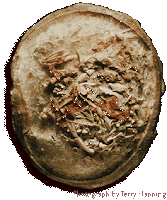 i read this news in hindustan times i found it very intresting and so i am decided to post this this news as it is in my blog
i read this news in hindustan times i found it very intresting and so i am decided to post this this news as it is in my blog so that every visitor of my blog can read this news
so that every visitor of my blog can read this newsA team of Indian palaeontologists has discovered a nest with 12 dinosaur eggs - the largest in a single nest - in Dhar district of Madhya Pradesh. The fossilised eggs will be subjected to radio scan to ascertain whether there is an embryo inside them.
"All the eggs were discovered from a single nest on the banks of the Hath ini river," researcher Vishal Verma said over phone from Dhar.
ini river," researcher Vishal Verma said over phone from Dhar.
Hundreds of such eggs have been found in the Kukshi-Wagh area of western Madhya Pradesh's Manavar tehsil in Dhar, said Verma, director Mangal Panchayatan Parishad. Amateur researchers, including Govind Verma and Rajesh Chouhan, have been digging around the area for dino fossils for more than a decade.
Dinosaur eggs are a great fascination for palaeontologists. The eggs, in their actual form, are said to be hard enough to escape predators' attacks, yet soft for the baby reptile to break through on birth.
 "These animals used to come from faraway areas to lay eggs on the sandy banks of the rivers in this area, identified scientifically as Lameta bed. The animals were 40-90 feet in length," said Verma, adding, "The richest dinosaur field in India is in the Deccan Traps near Jabalpur (in central India)."
"These animals used to come from faraway areas to lay eggs on the sandy banks of the rivers in this area, identified scientifically as Lameta bed. The animals were 40-90 feet in length," said Verma, adding, "The richest dinosaur field in India is in the Deccan Traps near Jabalpur (in central India)."
In 1828, then East India Company Army Captain, William Sleeman, was the first to find a cache of large bones in the Jabalpur Cantonment. Since then, several discoveries have been made in the Narmada valley in Jabalpur in the state to Kheda in Gujarat.
The eggs in Kukshi-Wagh area were first found in February this year when the Parishad members claimed to have discovered 100 eggs and 40 eggs on two different occasions. "We also found footprints of the dinosaurs through which the 'track way' of the now extinct heavy animals could also be traced," Verma, said.
Verma, who has been associated with such discoveries for over a decade, hopes that such discoveries would open the doors for science tourism in Madhya Pradesh.
 He said: "The discovery of more fossilised eggs of herbivorous dinosaurs belonging to the early Cretaceous era - that dates back to 65 million years or so - is expected to go a long way in the study of the pre-historic life in the Narmada Valley."
He said: "The discovery of more fossilised eggs of herbivorous dinosaurs belonging to the early Cretaceous era - that dates back to 65 million years or so - is expected to go a long way in the study of the pre-historic life in the Narmada Valley."
Dinosaurs are believed to have ruled our earth for 165 million years. In fact their rule ended only about 65 million years ago. Later these giant reptiles became extinct. The hard body parts of the animals get fossilised under favourable conditions. Researchers get clues about the 'life style' of the dinos only through their fossil bones, eggs, coprolites (fecal matter) and footprints.
Verma said that dinosaur eggs were discovered from the same site in the past too, but there were only six or seven eggs per nest. This is the first time that so many eggs have been recovered from the site, he added. The find is a significant step in the study of pre-historic life in the Narmada Valley, which has been attracting palaeontologists from across the world since 1818.
The Parishad had earlier also discovered other findings, including of pre-historic humans like jewellery made from shells, elephant teeth and weapons made of bones and stone.
 "With the latest find, the scientists would be able to know more about the reasons of the extinction of dinosaurs. The nesting site would throw light on the variety of dinosaurs that existed in the Cretaceous era," said Geological Survey of India's Director (Palaeontology) DM Mohabey.
"With the latest find, the scientists would be able to know more about the reasons of the extinction of dinosaurs. The nesting site would throw light on the variety of dinosaurs that existed in the Cretaceous era," said Geological Survey of India's Director (Palaeontology) DM Mohabey.
Mohabey, who visited the area from May 11 to 13, has confirmed that the bones discovered by the Parishad members earlier were of dinosaur and has promised to get the area declared 'protected'.
The eggs in Kukshi-Wagh area were first found in February this year when the Parishad members claimed to have discovered 100 eggs and 40 eggs on two different occasions.